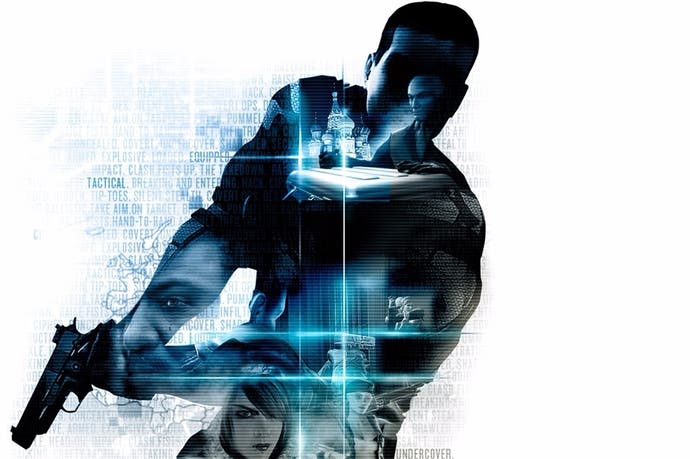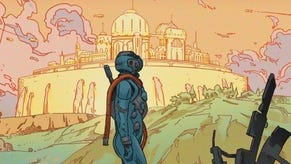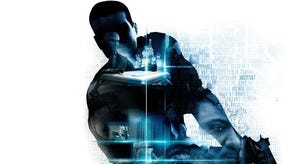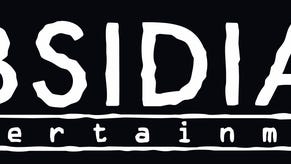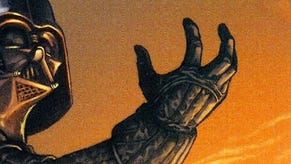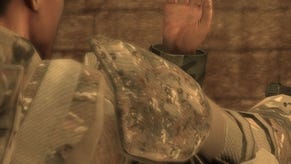The making of Alpha Protocol, Obsidian's secret best RPG
I, spy.
Imagine a glitzy cinematic sequence where you, as a secret agent, fight your way through an aeroplane soaring through the sky. You're pressing button prompts appearing on the screen while your hero whacks, chops, spins and kicks at the baddie in your way. "You fight all the way down until eventually you beat the guy and rip off his parachute and, I don't know, break his neck, and he floats off and you use his parachute to land." Sounds great, like a James Bond or Jack Bauer or Jason Bourne scene, or something from Uncharted 3, which hadn't been made yet.
But this is Obsidian Entertainment talking, and the scene in question was from 10 years ago, before Pillars of Eternity, before South Park: The Stick of Truth, before Fallout: New Vegas. The scene was from Alpha Protocol, a spy game, Obsidian's own idea, and secretly one of its best. I'm in a room now, at Obsidian, with pictures of characters from Alpha Protocol framed on the walls around me, talking to Chris Parker, one of Obsidian's owners (and game director of Alpha Protocol) as well as a handful of other people from the Alpha Protocol team.
The scene Chris Parker is describing took a year and a half to make and cost something like $500,000. "This took an unbelievable amount of resources to build," he says. There was no way Obsidian could keep it up across a 20-hour game, or even across three hours, the team jokes. Nor did they want to. The sequence represented everything wrong with Alpha Protocol at the time. "It was kind of cool and it was kind of neat but it was way, way outside what our core gameplay was supposed to be. The fundamental RPG experience had gotten lost underneath a whole bunch of other stuff that seemed neat."
Obsidian's golden opportunity to make something original, rather than a sequel to someone else's game, was out of control, a headless chicken with no direction. Enough was enough, something drastic had to change, and the expensive aeroplane scene was scrapped, never to be seen again.
A year and a half earlier, in summer 2006, Obsidian was all excitement. Star Wars: Knights of the Old Republic 2 and Neverwinter Nights 2 were done and now Sega wanted a role-playing game - and Obsidian had a spy pitch in the wings for just such an occasion.
"That was just a five or six-page pitch," Parker says, which is uncommonly brief. "I remember it started in a narrative style and set up this idea of what Alpha Protocol was but that you were a burned agent - it borrowed from Burn Notice, which was a TV show at the time. Then it just kind of said, 'Yeah, be Jason Bourne and James Bond and Jack Bauer' - 24 was very in at the time - 'and kick a bunch of ass and use fancy tools.'"
It worked, Sega liked it, and in next to no time a contract for two and a half years of development was signed. Six months later Sega would also sign another deal with Obsidian for an Aliens role-playing game.
Good times, then. But outside of the six-page pitch Obsidian struggled to define what Alpha Protocol was. Which of the spy icons - Bond, Bauer or Bourne - would the game try to be like? Would it be an action game or a role-playing game? The pendulum swung back and forth but with no project leader never settled.
On top were technical concerns. The ubiquitous Unreal Engine 3 wasn't quite ready in 2006, and stealth, it turns out, is bloody hard to do. Enemies need brains to respond to sneakers, and levels need sneaking routes. What's more, while Obsidian knew RPGs it only had a handful of people who knew anything about making shooters. "It was a struggle," says Matt MacLean, who was lead systems designer on the game.
Alpha Protocol wasn't the only struggle either. The Aliens RPG, Aliens: Crucible, was up poop creek too. "We all recognised we had put Sega in a hard situation," says Feargus Urquhart, another of Obsidian's owners and also CEO. Chris Parker adds: "It was a situation where we figured the hammer was going to fall somewhere but we didn't know necessarily where it was going to fall."
The hammer fell on Aliens: Crucible - but it was a wake up gong for Alpha Protocol. The project could go no further as it was. Chris Parker was brought in as lead producer/game director and Chris Avellone (another owner) as lead designer. Parker says, "We had a big 'coming to Jesus' meeting where we decided what are all the things we wanted to do and didn't want to do."
Before the big meeting, there weren't any spy safe houses. "You'd go to Moscow and go straight through Moscow," Matt MacLean says. "It almost felt like a series of first-person shooter levels. The extreme over-correction would have been 'let's make an open-world city!', but no, we don't have time to do that. But what we can do is let the player move between the hubs."
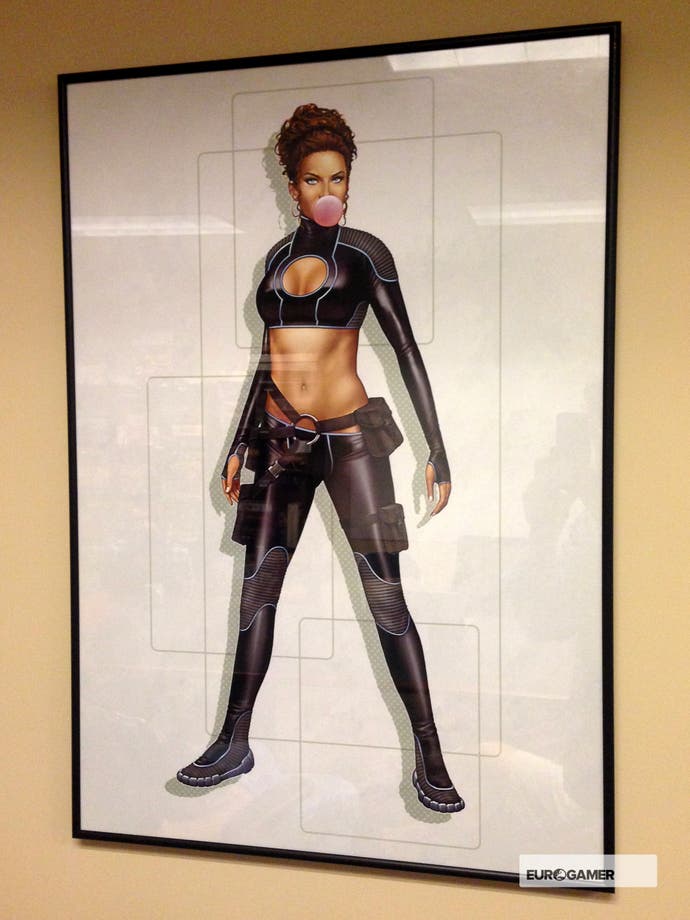
Before the big meeting, Alpha Protocol's infamous mini-games were even worse. "The original mini-games were several minutes of 'this is a whole new game in and of itself'," MacLean says. "The best thing to liken it to is the way BioShock tried to solve hacking by doing a little puzzle game within.
"We were trying to do a puzzle game but it didn't really feel like what you were doing and took too long to resolve. Are you just sitting here hacking for three minutes while guys are shooting at you? Or do we pause the world - in which case if we pause the world, where's the pressure?"
Chris Parker remembers it more bluntly: "We had these mini-games that were clearly not fun, nobody liked them. There were a lot of arguments about how to make them fun, but what we had to do was actually back up and go, 'No, they're not fun, let's throw them away and have them do this.'"
The team even toyed with scrapping mini-games altogether in favour of a time or resource component instead, but apparently Sega wanted them in. "So the mini-games that we shipped with are..." MacLean exhales, because he made them, "the redeeming feature is that they're faster."
Before the big meeting, there was parkour. "We did all these really specific parkour elements," Parker says. "I don't know how the player was supposed to know this - again, why this was cut - but there was a path where you can go around to shoot some guys, or, if you walk over to this crack in the wall and hit A, Mike would do this fancy spider-climb up through the middle of it, which did look super-cool. It was kind of neat but are we going to go through and make levels that are just filled with exceptions? The pay-off just really wasn't there."
Before the big meeting, there was environmental interaction. "You're running through this airplane graveyard and we've conveniently placed enemies underneath the props of these airplanes," Parker says, "and if you shot the middle of the props then the props would fall down and kill the enemies. It was like, 'Ohh this is great!'
"It wasn't great," he adds, "it was a lot of work and it didn't have a whole lot of pay-off. People found it just as much fun to get in a straight out firefight over figuring out where we game-designed-in some cool environmental interactions, so we scrapped that."
Before the big meeting, there were on-rails motorbike and yacht chase sequences - hence the motorbike in Alpha Protocol, and the yacht ("but there is no chase to get to the yacht - we spared you that part," MacLean says).
"We were always going to have chase sequences," Parker says, "that was how the parachute [in the scrapped demo sequence] came to be. When we refactored the game we just said, again, 'that seems like a whole lot of work for not a lot of pay-off' and outside of the core of what we wanted to do."
Before the meeting there was also another major female character called Uli Booi. So much work was done on her that her picture hangs alongside the other notable Alpha Protocol characters on the wall in front of me (pictured above).
By the time the big meeting was over, Obsidian had a solid vision for Alpha Protocol at last - a kind of Jason Bourne adventure with baddies as zany as in Kill Bill, Chris Avellone would later say. The game would take longer to make and cost more money than originally budgeted but Sega's confidence was restored, and so was the team's. "The direction we were going wasn't something everyone was completely happy with so changing that around ... it really revitalised a lot of the team," says Tyson Christensen, lead level designer on the game.
What lay ahead was simply months of hard work. And, inevitably, as push came to shove, there were sacrifices. Good artificial intelligence was one of them. "One of the big complaints after the game came out was the AI was not good enough and too stupid, and that was a factor of time," Parker says.
"We put together a really cool AI system but it sucked up too much performance and it was eating frames from the game and we had to get performance up. We wound up making our guys stupider late in development because there wasn't a good way to go back and change it at that point. If we could have gone back in time we could have come up with a better overall system but it was too late to do that."
Another sacrifice was the option of playing as a female character, a Michaela Thorton or a Michelle Thorton. "All of us would have loved to support such a choice, but for the game we were making it was just 'we have to do it'," Matt MacLean says.
"We would have to re-record every cutscene with a female actor and change any use of 'him' or 'her' or 'Mike' in reference to the protagonist. We'd almost double on our voice acting budget - at least the main character would have to re-record each line. It was a cost thing: we made the decision it's only Mike Thorton and saved 60 per cent of our voice acting and animation budget."
But there were unforeseen changes for the better too. The mission debriefs you see at the end of a level, the ones telling you what you have and haven't accomplished: they weren't intended to be shown. They were for internal development feedback. But one tester played a version accidentally displaying them, and he loved it. "It was a bug to us but he was like, 'You guys should keep this in there!'" Tyson Christensen says, and so Obsidian did.
With rolled up sleeves and gritted teeth Obsidian finished Alpha Protocol and, according to the team in front of me, did so in time for the advertised October 2009 release. "We were set to ship at the end of 2009," Parker says. "The game was basically done to ship in 2009." Why, then, was Alpha Protocol delayed until May 2010? "It slipped into 2010 for reasons we'll never be able to answer in this room. They [Sega] held it until 2010," he says.

But that was OK wasn't it? It meant Obsidian had more time to polish, more time to fix bugs. Well no. "We had 20 people fixing bugs on the product and they were all going to be done by the end of September," Parker recalls. "But that was when they said, 'We're not going to ship it this year any more,' so the team went to 10 and fixed bugs through to the early calendar year. And then it sat around for around six months."
The team at Obsidian was - and still is by the sound of it - confused. They knew there were bugs in the game and didn't understand why they couldn't use the delay to address them. "We've come this far, how do you guys just leave it in the can and not put it directly to the shelves?" Matt MacLean remembers thinking. "Why don't we use this delay to fix more bugs?"
Presumably - and I've asked Sega for comment - Sega moved Alpha Protocol to avoid other big game releases. In autumn 2009 there was Call of Duty: Modern Warfare 2 and Uncharted 2. Then in early 2010 there was Mass Effect 2 ("oh dammit - we're going to have to follow Mass Effect 2?" was Obsidian's reaction) Battlefield: Bad Company 2 and Tom Clancy's Splinter Cell Conviction. You can see Sega's thinking.
Regardless, May 2010 rolled around and Alpha Protocol's release neared. Obsidian knew the game wasn't perfect but was proud of what had been made. "We always talk about how we think a game is going to rate before it launches," Chris Parker says. "We all expected [Alpha Protocol] to land around 80. We knew it had some issues, we understood all of that, but we thought if people could just get over those things the content would pull through.
"When it launched and it did significantly worse... it was pretty disheartening."
But as time passed, opinion began to change. People looked beyond the jankiness and began to appreciate the web of reactivity and choice and consequence Obsidian had spun. Here was a game which could look very different based on decisions you'd made. "There was one particular cutscene at the end that had so many character combinations in it it took probably 20 days of work time to do," Tyson Christensen says.
Here too was a game which could play very differently based on how you played. I killed four major characters in cold blood and Alpha Protocol not only tracked this and gave me an achievement, it gave me a permanent +1 damage with my favoured weapon as a reward. It made it feel like Alpha Protocol was listening to me, and it's always so nice to be heard.
Alpha Protocol was purposefully brisk, too, a Sunday afternoon James Bond film of a game rather than a Lord of the Rings epic we see so much of today. Obsidian knew it couldn't show you all possible choice permutations in one sitting so it needed to make the game stomachable to play again. "At some point the length of the game becomes a virtue," Matt MacLean says. Not often you hear an RPG maker say that.
Tieing into that brilliantly was Alpha Protocol's time-pressured dialogue, which gives you a moment to make a dialogue choice before it chooses for you, forcing the pace throughout. "There was a lot of internal division about it with some people saying, 'This is totally not how RPGs do it! Players are going to be stressed out and hate this,'" senior designer Charles Staples says. "But apparently people seem to like it."
All of this consequence and time pressure has a brilliant knock-on effect. In the Rome level there's a filthy ice cream parlour and a filthy guy the team has nicknamed Gelato Dude. You need to talk to him undercover to get information. One wrong move and he'll be onto you. It's eerie and tense and also, it turns out, all for show.
"There's really not as much nonsense going on as you think," Matt MacLean says, "but because it's so creepy and you don't have time to think about your choices, it feels more stressful than it actually is. This creepy Gelato dude actually scares you because you don't have time to think about the situation."
It's for these reasons and more, Alpha Protocol enjoys a cult following now. "It's funny that with time and distance it's been getting the recognition it almost deserves," MacLean says, "because it is a fun, quirky, bizarre game."
And it's for these reasons and more people want an Alpha Protocol 2. "We finished a complete pitch for Alpha Protocol 2," Chris Parker says. "It's a pretty detailed pitch about 35-40 pages long. A lot of it was to do with fundamentally revisiting some of the gameplay systems to get some of the jankiness out of them and shore them up overall. I know the intention was to focus on reactivity because we knew that was one of the things people loved the most.
"I remember there was this idea I didn't think we could ever pull off. It was this choice and consequence web people wanted to have in the interface so you could see your choices and how they spider-webbed through [everything]. There were so many ways to play through the first game I don't think we could ever do that in the second one, but that was an idea people really wanted to pursue."
But Obsidian cannot make Alpha Protocol 2 without Sega sanctioning it, because Sega owns the game, the intellectual property, and when I asked Sega it didn't sound like an AP sequel was part of any kind of plan. But the real kicker in all of this - the absolute heart-wrencher - is Sega almost didn't own the IP, Obsidian did. What scuppered it was Disney cancelling the Seven Dwarves Snow White spin-off Obsidian was making after Neverwinter Nights 2.
"When the Dwarves thing happened we were practically done with an agreement with Sega to do Alpha Protocol," Feargus Urquhart says, "but what this cost us - Dwarves getting cancelled and that contract - was the Alpha Protocol IP. Having to get that contract signed right away... Originally we were going to own the Alpha Protocol IP."
As it stands, Alpha Protocol 2 can go nowhere but the bulging drawer of Obsidian game ideas and pitches I've been lucky enough to rummage through. Alpha Protocol, meanwhile, remains Obsidian's heartbreaking attempt at launching an original series. "It's a game that we go back to every now and then and say, 'Remember how we completely fucked this thing up in AP? Let's not do that again,' because we spent a year-and-a-half working on a game ultimately no one really liked and we had to refactor and took us forever to finish, and arguably we didn't finish it in some ways," Chris Parker says.
"It's also used as an example of how to do a ton of really solid reactivity in ways that are meaningful. Sometimes in our quest to make reactive worlds in role-playing games we do things that are not meaningful, and nobody really remembers or cares about those things. The way that AP handled that stuff, the things that changed on everybody's playthrough are meaningful - they're kind of in your face. They're things that people take away from a playthrough."
I wish more games were like Alpha Protocol.
Disclaimer: Travel and accommodation for this trip was provided by Paradox Interactive.
